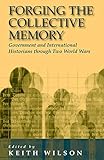Forging the Collective Memory : Government and International Historians through Two World Wars / ed. by Keith Wilson.
Material type: TextPublisher: New York ; Oxford : Berghahn Books, [1996]Copyright date: ©1996Description: 1 online resource (224 p.)Content type:
TextPublisher: New York ; Oxford : Berghahn Books, [1996]Copyright date: ©1996Description: 1 online resource (224 p.)Content type: - 9781571819284
- 9781782388289
- 907/.2
- D13 .F5945 1996
- online - DeGruyter
| Item type | Current library | Call number | URL | Status | Notes | Barcode | |
|---|---|---|---|---|---|---|---|
 eBook
eBook
|
Biblioteca "Angelicum" Pont. Univ. S.Tommaso d'Aquino Nuvola online | online - DeGruyter (Browse shelf(Opens below)) | Online access | Not for loan (Accesso limitato) | Accesso per gli utenti autorizzati / Access for authorized users | (dgr)9781782388289 |
Frontmatter -- CONTENTS -- Acknowledgements -- INTRODUCTION Governments, Historians, and ‘Historical Engineering’ -- Chapter 1 THE HISTORICAL DIPLOMACY OF THE THIRD REPUBLIC -- Chapter 2 THE UNFINISHED COLLECTION Russian Documents on the Origins of the First World War -- Chapter 3 CLIO DECEIVED Patriotic Self-Censorship in Germany After the Great War -- Chapter 4 SENATOR OWEN, THE SCHULDREFERAT, AND THE DEBATE OVERWAR GUILT IN THE 1920S -- Chapter 5 HISTORY AS PROPAGANDA The German Foreign Ministry and the ‘Enlightenment’ of American Historians on the War-Guilt Question, 1930–1933 -- Chapter 6 AUSTRIA AND THE GREAT WAR Official Publications in the 1920s and 1930s -- Chapter 7 THE PURSUIT OF ‘ENLIGHTENED PATRIOTISM’ The British Foreign Office and Historical Researchers During the Great War and Its Aftermath -- Chapter 8 THE IMBALANCE IN BRITISH DOCUMENTS ON THE ORIGINS OF THE WAR, 1898–1914 Gooch, Temperley, and the India Office -- Chapter 9 TELLING THE TRUTH TO THE PEOPLE Britain’s Decision to Publish the Diplomatic Papers of the Interwar Period -- Appendix HAROLD WILSON AND THE ADOPTION OF THE THIRTY-YEAR RULE IN GREAT BRITAIN -- NOTES ON CONTRIBUTORS -- INDEX
restricted access online access with authorization star
http://purl.org/coar/access_right/c_16ec
When studying the origins of the First World War, scholars have relied heavily on the series of key diplomatic documents published by the governments of both the defeated and the victorious powers in the 1920s and 1930s. However, this volume shows that these volumes, rather than dealing objectively with the past, were used by the different governments to project an interpretation of the origins of the Great War that was more palatable to them and their country than the truth might have been. In revealing policies that influenced the publication of the documents, the relationships between the commissioning governments, their officials, and the historians involved, this collection serves as a warning that even seemingly objective sources have to be used with caution in historical research.
Mode of access: Internet via World Wide Web.
In English.
Description based on online resource; title from PDF title page (publisher's Web site, viewed 25. Jun 2024)


